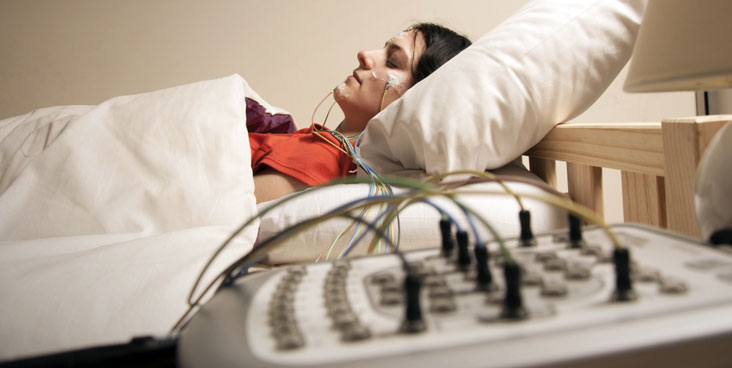Polysomnography

What Is A Polysomnography
Polysomnography (PSG) is a study or test done while you’re fully asleep. Your doctor will observe you as you sleep, record data about your sleep patterns, and identify any sleep disorders. Your doctor will measure the following during PSG to help chart your sleep cycles:
brain waves
skeletal muscle activity
blood oxygen levels
heart rate
breathing rate
eye movement
PSG registers your body’s shifts between the two stages of sleep, which are rapid eye movement (REM) sleep, and non-rapid eye movement (non-REM) sleep. Non-REM sleep is divided into “light sleep” and “deep sleep” phases.
During REM sleep, your brain activity is high, but only your eyes and breathing muscles are active. This is the stage in which you dream. Non-REM sleep involves slower brain activity. A person without a sleep disorder will switch between non-REM and REM sleep about every 90 minutes, experiencing four to six sleep cycles per night.
Observing your sleep cycles, along with your body’s reactions to the changes in these cycles, can help identify disruptions in your sleep patterns.
Why Do I Need A Polysomnography
Your doctor can use PSG to diagnose sleep disorders. It often evaluates for symptoms of sleep apnea, a disorder in which breathing constantly stops and restarts during sleep. The symptoms of sleep apnea include:
sleepiness during the day despite having rested
ongoing and loud snoring
periods of holding your breath during sleep, which are followed by gasps for air
frequent episodes of waking up during the night
restless sleep
Polysomnography can also help your doctor diagnose the following sleep disorders:
narcolepsy, which involves extreme drowsiness and “sleep attacks” during the day
sleep-related seizure disorders
periodic limb movement disorder or restless leg syndrome, which involves uncontrolled flexing and extension of the legs while asleep
REM sleep behavior disorder, which involves acting out dreams while asleep
chronic insomnia, which involves having difficulty falling asleep or remaining asleep
The National Heart, Lung, and Blood Institute (NHLBI) warns that if sleep disorders go untreated, they raise your risk of heart disease, high blood pressure, and stroke. There’s also a link between sleep disorders and an increased risk of injuries related to falling and car accidents.
